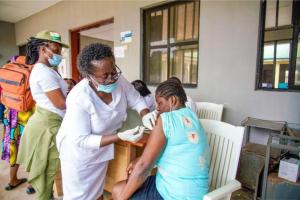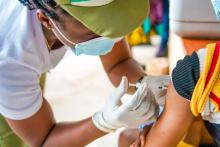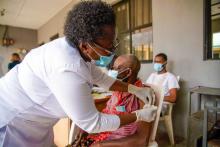Imo leaves no stone unturned, takes COVID-19 vaccination to the last mile
Owerri, 9 November, 2022 - Sitting on a row of wooden benches in front of a Primary Health Care (PHC) Ccntre, at Egbu village in Owerri North Local Government Area (LGA), of Imo State, Southeast Nigeria, was over 20 people waiting to receive doses of the COVID-19 vaccine.
On the queue was Nwaneri Christiana, a 32-year-old student, who waited patiently for her turn to receive the first shot of COVID-19 vaccination.
Ms Nwaneri said the uncertainty about the side effect of the COVID-19 vaccine had made her reluctant to receive the shots since it was rolled out in March, 2021.
“I was hesitant because of some messages I read on WhatsApp and other social media platforms, saying the vaccines had substances that could cause harm to one’s health. It was after people around me took the vaccines and survived that I developed faith in it.
I now know that the vaccine is safe. The fact that the vaccine is available in my locality encouraged me to walk into the health centre to receive it. I also mobilized my friends to take it because the COVID-19 outbreak is not yet over,” she said.
Implementation of the SCALES 3.0, launched by the Federal government, is aimed at integrating the COVID-19 vaccination with other health servies at PHC level. Furthermore, with S.C.A.L.E.S, government’ plans to expand COVID-19 vaccination among hard to reach populations as well as vaccinate at least 70% of eligible Nigerians by December 31, 2022. The strategy enabled Ms Nwaneri to receive the first shot at the health facility in her village.
SCALES is an acronym for Service delivery, Communication, Accountability, Logistics, Electronic management of immunization data and supportive supervision.
Expanded services
About 20 months after the rollout of the vaccination campaign against the coronavirus pandemic, the Nigerian government has said only about 49 880 420 million eligible persons have been fully vaccinated as at 01 November 2022.
To achieve herd immunity against COVID-19, Nigeria planned to get 40% of its population vaccinated by the end of 2021 and 70% vaccinated by the end of 2022.
This is based on the recommendation from the World Health Organization ( WHO ).
In Imo Dr Okeji Austine, the Director of Public Health, Imo state Ministry of Health said , government in collaboration with partners including WHO, is deploying the SCALES 3.0 strategy, concentrating rural area vaccination campaigns, to provide access to all.
Commending the partners for supporting the campaign, Dr Okeji said the government is committed to ensuring that all people in the state are protected from COVID-19.
However, while the government prioritized health workers and vulnerable persons during the rollout of the vaccination, a 35 years-old health worker in Owerri, Imo state, said she only recently summoned the courage to receive the COVID-19 vaccine.
Ms Patrick received her first dose in August 2022 and has since been encouraging people in her community as well as those who attend the health centre where she works, to receive the vaccine.
“Although the government gave assuring messages about the safety of the vaccine, I was still unsure. I knew my action deterred many people from receiving the vaccine because people asked me if I had received it.
They also wanted to see the evidence which was my vaccine card. And when I could not provide it, they declined the vaccination,t. Since I received my COVID-19 vaccine, I now encourage others by showing them my COVID-19 vaccination card”, she said.
Leaving no one behind
Since the commencement of COVID-19 vaccination in Nigeria, the government, through Nigeria Primary Health Care Development Agency (NPHCDA), with support from partners, including WHO, implemented strategies ensuring all eligible Nigerians have access to the COVID-19 vaccine.
A health worker who has been working with the COVID-19 vaccination team since the rollout in 2021, Mrs Onyeagba Goodness, said people still turn out daily to the health centre to receive the COVID-19 vaccine.
Mrs Onyeagba said, “since the commencement of the SCALES 3.0 campaign, the turnout has been encouraging because of the integration of the Routine Immunization (RI), COVID-19 vaccination and other PHC services”.
“The integration created the opportunity to vaccinate the elderly and some women who have not been vaccinated. Sometimes the husbands or family members who bring their children for routine immunization also take advantage of the strategy to get vaccinated,” she said.
Furthermore, the WHO Country Representative, Dr Walter Kazadi Mulombo said during the launch of S.C.A.L.E.S 3.0 in Abuja that WHO has been supporting the government through the NPHCDA to scale up national vaccination coverage strengthen the country’s health systems, and overcome the impact of the pandemic.
Dr Mulombo said it is a well-known fact that, “ if we get vaccinated, we are protecting ourselves, our children and our families.”
Before the launch of the SCALE 3.0 strategy, WHO supported government to build capacity of 976 health workers on SCALE 3.0 strategy across the 36 states in Nigeria and the Federal Capital Territory.
Other WHO support includes, leadership and coordination of COVID-19 vaccination, real-time COVID-19 vaccination data management, infodemic management and evidence generation to aid demand generation, supportive supervision, payment of stipends to vaccination team members, procurement of COVID-19 vaccination items, Adverse Event Following Immunization (AEFI) surveillance.
Technical Contact
Wadzingi, Williams; Email: wadzingiwil [at] who.int (wadzingiwil[at]who[dot]int)


